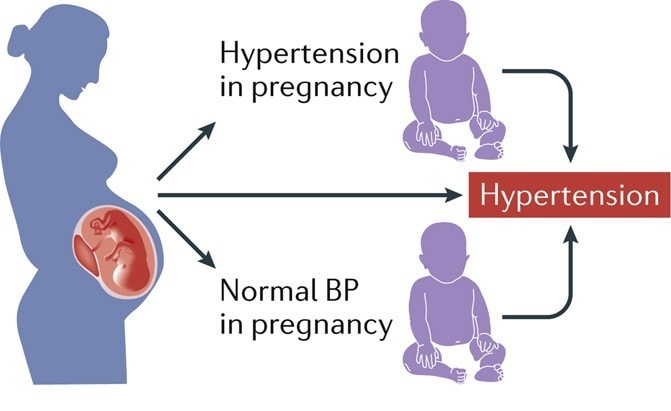How To Manage Hypertension During Pregnancy?

Hypertension during pregnancy, also known as pregnancy-induced hypertension (PIH), is a significant concern due to its association with adverse maternal and fetal outcomes. This condition is characterized by elevated blood pressure levels, typically occurring after the 20th week of gestation.
The management of hypertension during pregnancy is crucial to mitigate potential risks and ensure the well-being of both mother and baby. This article aims to provide an overview of the strategies and interventions used to manage hypertension during pregnancy.
The key areas of focus include:
- Regular blood pressure monitoring
- Adopting a healthy lifestyle
- Medication management
- Controlling weight gain
- Avoiding triggers and risk factors
- Monitoring fetal well-being
- Seeking support and guidance.
By implementing these measures, healthcare professionals can effectively manage hypertension during pregnancy, reduce complications, and improve the overall outcomes for both the mother and the baby.
Key Takeaways
- Healthcare professionals and support are crucial in managing hypertension during pregnancy.
- Regular monitoring of blood pressure and medication as prescribed are important.
- Lifestyle modifications such as a healthy diet, exercise, and stress management are essential.
- Regular prenatal check-ups, awareness of warning signs, and early detection are necessary for better outcomes.
Understanding Hypertension During Pregnancy
Hypertension during pregnancy, a condition characterized by high blood pressure, poses significant risks to both the mother and the developing fetus. It is crucial to prevent complications associated with this condition by closely monitoring blood pressure levels and implementing appropriate interventions.
One way to manage hypertension during pregnancy is through dietary modifications. Consuming a healthy and balanced diet can help regulate blood pressure and reduce the risk of complications. This includes limiting sodium intake and increasing the consumption of fruits, vegetables, whole grains, and lean proteins.
Additionally, it is essential to avoid excessive weight gain during pregnancy as it can exacerbate hypertension. Regular exercise, under the guidance of a healthcare professional, can also be beneficial.
By following a well-rounded approach that combines dietary modifications and regular exercise, women can effectively manage hypertension during pregnancy and minimize the associated risks.
Regular Blood Pressure Monitoring
Regular blood pressure monitoring is crucial for pregnant women to ensure the well-being of both the mother and the baby, promoting a sense of security and peace of mind during this delicate period. It allows healthcare providers to closely monitor any changes in blood pressure and take appropriate actions to prevent complications associated with hypertension during pregnancy.
To effectively manage hypertension during pregnancy, regular blood pressure monitoring provides valuable information that helps healthcare providers make informed decisions. It enables them to identify any sudden spikes or persistent high blood pressure, which may indicate the need for medication adjustments or other interventions.
Additionally, regular blood pressure monitoring facilitates the detection of any potential complications, such as preeclampsia, which can develop rapidly and pose risks to both the mother and the baby.
To further support blood pressure management, lifestyle modifications can be suggested based on the blood pressure readings. These may include dietary changes, regular exercise, stress reduction techniques, and adequate rest. By closely monitoring blood pressure and implementing appropriate lifestyle modifications, the risk of complications can be reduced, promoting a healthier pregnancy for both the mother and the baby.
Adopting a Healthy Lifestyle
Adopting a healthy lifestyle is essential for pregnant women, as it enables them to prioritize their well-being and create an environment that supports the growth and development of their baby.
Nutritional guidance plays a crucial role in managing hypertension during pregnancy. Women should aim for a well-balanced diet that includes a variety of fruits, vegetables, whole grains, lean proteins, and low-fat dairy products. It is important to limit the intake of sodium and processed foods, as they can contribute to increased blood pressure.
Additionally, regular exercise is recommended for pregnant women with hypertension. Moderate-intensity activities such as walking, swimming, or prenatal yoga can help improve cardiovascular health and reduce blood pressure. However, it is important to consult with a healthcare provider before starting any exercise routine to ensure safety for both the mother and baby.
By following these lifestyle recommendations, pregnant women can effectively manage hypertension and promote a healthy pregnancy.
Medication Management
Medication management is an important aspect of treating high blood pressure in pregnant women, as it can help control blood pressure levels and reduce the risk of complications. While lifestyle changes are the first line of defense, some women may require medication to manage their hypertension during pregnancy. There are several medications available that are considered safe for use during pregnancy, including methyldopa, labetalol, and nifedipine. These medications work by relaxing blood vessels and reducing blood pressure. It is crucial for pregnant women with hypertension to work closely with their healthcare provider to find the most appropriate medication and dosage. Additionally, alternative treatments such as acupuncture, yoga, and meditation may be considered, but further research is needed to determine their effectiveness in preventing complications associated with hypertension during pregnancy.
| Medication Name | Mechanism of Action |
|---|---|
| Methyldopa | Stimulates alpha receptors |
| Labetalol | Blocks alpha and beta receptors |
| Nifedipine | Blocks calcium channels |
Managing Weight Gain
Maintaining a healthy weight is crucial in promoting a balanced and stable physiological state during pregnancy. Women with hypertension need to be particularly mindful of their weight gain to prevent complications.
Excessive weight gain during pregnancy can contribute to the development or worsening of hypertension, as well as increase the risk of preeclampsia and gestational diabetes.
To manage weight gain, dietary modifications should be implemented. A balanced diet rich in fruits, vegetables, whole grains, lean proteins, and low-fat dairy products is recommended. Portion control and avoiding high-calorie, processed foods are also essential.
Regular physical activity, within the limits determined by the healthcare provider, can complement a healthy diet.
By managing weight gain through appropriate dietary modifications, women with hypertension can reduce the risk of complications and promote a healthier pregnancy.
Avoiding Triggers and Risk Factors
To minimize the chances of complications, it is important to identify and avoid potential triggers and risk factors that can contribute to the development or worsening of hypertension in pregnant women.
Avoiding stress is crucial, as it has been associated with an increased risk of developing hypertension during pregnancy. Pregnant women should try to minimize stressful situations and engage in stress-reducing activities such as yoga, meditation, or deep breathing exercises.
Additionally, dietary modifications play a significant role in managing hypertension during pregnancy. It is recommended to follow a low-sodium diet, as excessive sodium intake can lead to fluid retention and increased blood pressure. Pregnant women should also consume a diet rich in fruits, vegetables, whole grains, and lean proteins to ensure a balanced intake of essential nutrients.
These dietary modifications, along with stress reduction techniques, can help in managing hypertension during pregnancy.
Monitoring Fetal Well-being
Monitoring fetal well-being is crucial for ensuring the health and safety of the developing baby during pregnancy. It allows healthcare professionals to detect any potential complications or abnormalities that may arise. There are various methods employed to monitor fetal well-being, including ultrasound scans, fetal heart rate monitoring, and measuring the mother’s blood pressure.
- Ultrasound scans: These are used to assess fetal growth and development. They provide valuable information about the baby’s size, position, and overall well-being.
- Fetal heart rate monitoring: This involves using a Doppler device or electronic fetal monitor to track the baby’s heart rate. Changes in the heart rate pattern can indicate fetal distress.
- Measuring blood pressure: High blood pressure in the mother can affect fetal growth and development. Regular monitoring helps identify any potential risks and allows for timely intervention.
In addition to these methods, monitoring fetal movement is also important. A decrease in fetal movement can be a sign of fetal distress and should be reported to the healthcare provider immediately. By closely monitoring fetal growth and movement, healthcare professionals can ensure the well-being of both the mother and the baby throughout the pregnancy.
Seeking Support and Guidance
Seeking support and guidance from healthcare professionals and support networks is essential for pregnant individuals to navigate the challenges and uncertainties that may arise throughout their pregnancy journey. One way to seek support is by seeking counseling. Counseling can provide a safe space for pregnant individuals to express their concerns, fears, and emotions related to managing hypertension during pregnancy. A trained counselor can offer guidance, coping strategies, and tools to help manage stress and anxiety associated with this condition.
Additionally, joining support groups can be beneficial. Support groups provide a platform for pregnant individuals to connect with others who are going through similar experiences. They can share their stories, exchange information, and offer emotional support. Being part of a support group can help reduce feelings of isolation and provide a sense of community during this challenging time.
Frequently Asked Questions
Can hypertension during pregnancy cause any long-term health problems for the mother?
Hypertension during pregnancy can lead to long-term health problems for the mother. Risk factors such as pre-existing hypertension, gestational hypertension, and preeclampsia increase the likelihood of complications, including cardiovascular disease, kidney dysfunction, and stroke, later in life.
Are there any alternative treatments or home remedies for managing hypertension during pregnancy?
Alternative therapies and natural remedies can be used to manage hypertension during pregnancy. These treatment options may include relaxation techniques, acupuncture, dietary changes, exercise, and herbal supplements. However, it is important to consult with a healthcare professional before trying any alternative treatments.
Is it safe to continue exercising during pregnancy if I have hypertension?
Exercising precautions are necessary for pregnant women with hypertension to ensure their safety. Regular monitoring of blood pressure levels is crucial to prevent potential complications and maintain optimal health during pregnancy.
Can stress or anxiety worsen hypertension during pregnancy?
Stress and anxiety can exacerbate hypertension during pregnancy. Stress management and relaxation techniques, such as deep breathing exercises and mindfulness meditation, are recommended to help alleviate these symptoms and promote better blood pressure control.
How soon after delivery does hypertension typically resolve?
Postpartum hypertension, also known as postpartum recovery, typically resolves within a few weeks after delivery. It is important for healthcare providers to monitor blood pressure levels and provide appropriate follow-up care to ensure a smooth recovery process.









